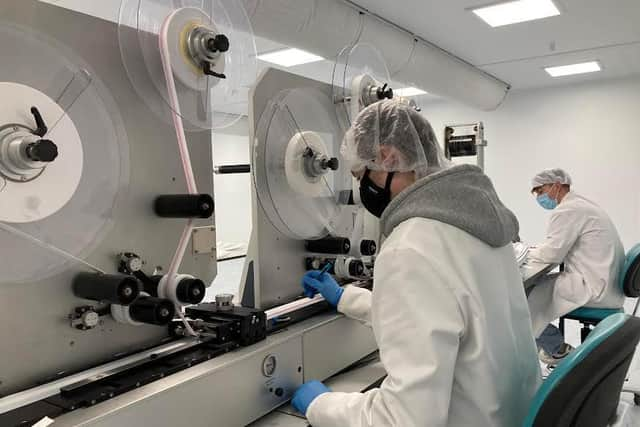Yorkshire lab launches finger-prick Covid test
The York-based firm said the test will be used by professionals or trained lay-users, meaning that Government agencies, pharmacists, testing centres and workplaces can use the test to identify and monitor a person’s antibody-based protection level to Covid-19.
The test detects the presence of IgG neutralising antibodies to the full trimeric spike protein of the SARS-CoV-2 virus and produces semi-quantitative results via a line intensity scorecard.
Advertisement
Hide AdAdvertisement
Hide AdThe product was initially launched for research purposes in September.


The presence and strength of IgG neutralising antibodies following infection and/or vaccination is a key indicator of an individual’s protective immune response to Covid-19.
The intensity of the line on the scorecard, which can be seen visually, is proportional to the number of IgG antibodies present in the finger-prick blood sample, with higher levels of antibodies producing a stronger test line.
The scorecard used for the test has been referred to in studies, including one from the University of Birmingham showing the test line response to be proportional to the number of antibodies in an international standard.
Advertisement
Hide AdAdvertisement
Hide AdData gathered during the validation of the test confirmed that antibody responses to vaccination and infection differ from person to person.
Each participant in its validation study was tested weekly before and after vaccination.
The data showed that the antibody response to first, second and booster vaccines varied considerably and that the change in antibody levels over time also varied by individual. For example, some participants maintained some level of IgG antibodies beyond 20 weeks after their second jab, whilst others showed a steeper decline.
These differences in immune response were also seen across familial households. This has significant implications for the individual, but also for governments with regards to monitoring the impact of vaccine programmes.
Advertisement
Hide AdAdvertisement
Hide AdThe data, in addition to conclusions made in other studies, emphasises the importance of understanding antibody levels to make informed decisions about when someone’s protection levels have decreased.
Recently, Pfizer announced that early studies indicate that robust protection against the Omicron variant could be achieved through a third dose of vaccine as this increases the antibody titres by 25-fold.
Recent research has also highlighted immuno-compromised individuals generate lower levels of antibodies compared with healthier people following two vaccine doses and that there are variations in vaccine-response between men and women.
A further study highlighted different responses in patient cohorts when comparing the Moderna and Pfizer-BioNTech vaccines, with one study noting antibody levels start to reduce at around two to three months after two vaccine doses.
Advertisement
Hide AdAdvertisement
Hide AdDetermining the presence and strength of IgG neutralising antibodies enables governments to give guidance on vaccine deployment to the most vulnerable.
For workplaces, understanding who is most at risk will shape return-to-work or health and safety policies.
The validation of vaccine certificates with antibody testing, for borders or large/crowded events, could help to determine risk levels for individuals.
In countries with lower vaccine supply, IgG neutralising antibody testing could be deployed to measure the population and direct vaccines to those with no or limited protection to the SARS-CoV-2 virus.
Advertisement
Hide AdAdvertisement
Hide AdChris Yates, chief executive of Abingdon Health, said: “Some countries are currently experiencing a fourth wave of Covid-19 and it is critical that we are able to accurately monitor our antibody levels to determine if and when we need booster vaccine doses.
"Our own research, as well as other published data, shows that there is a significant degree of variability between individuals in their antibody levels, following infection and/or vaccination.
On an individual level we believe there is an increasing need to know your antibody status as this will allow all of us to manage their own behaviour in light of own specific levels of immunity."
He said the important message from healthcare agencies is that high levels of antibodies, as seen following booster vaccinations, will help fight variants such as Omicron.
Advertisement
Hide AdAdvertisement
Hide Ad"This is important as antibody levels will wane over time," he added.
"Being able to monitor and track antibody levels using the AbC-19 Semi-Q Rapid Test provides this information to give another tool in our anti-Covid-19 toolbox.
“As research works towards achieving a globally recognised standard for antibody thresholds, tools such as the AbC-19 Semi-Q Rapid Test allow individuals, workplaces and governments to assess risk based on evidence of someone’s level of protective immune response.
"Doing so provides a means to implement appropriate and specific interventions or policies, at an individual or community level, rather than imposing blanket lockdowns.”
Comment Guidelines
National World encourages reader discussion on our stories. User feedback, insights and back-and-forth exchanges add a rich layer of context to reporting. Please review our Community Guidelines before commenting.